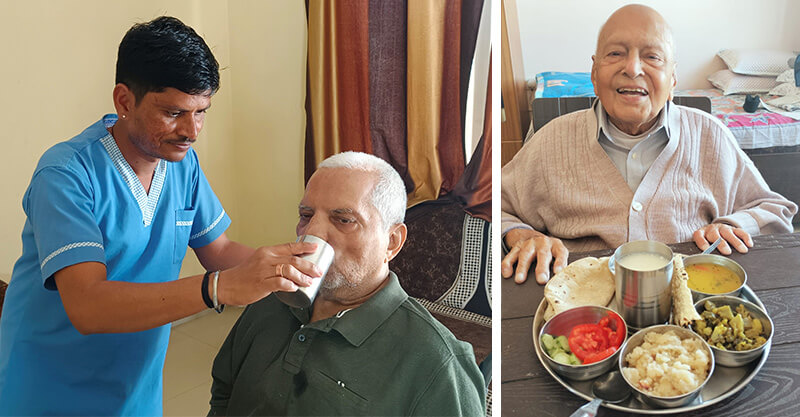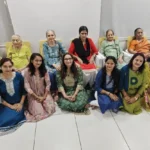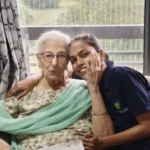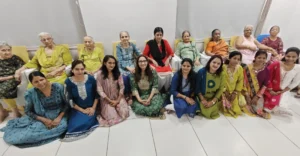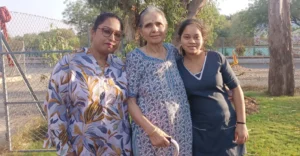Constant physiological and psychological take place throughout the various stages of life. We must understand the many challenges an aging body faces. Its need for food narrows down to specifics that support a simplistic lifestyle. Simplicity is the key to a healthy diet plan for elderly person. It is all about eating fresh, seasonal, and at regular intervals. Nutrient requirements change with age as the body is in degenerative mode, digestion gets poorer, bones become weak, and you develop low immunity.
Diet Plan for Elderly Individuals with Health Conditions
We need to keep every individual’s medical and physical condition in mind and then chart out diet plans for the elderly. Some may be able to take in old soft foods, some may need extra doses of certain nutrients, and some may have to restrict certain foods to maintain the balance for holistic living.
Foods to Include in Elderly Diet Plan
Bring in more colors and greens into the diet. The key is keeping it a balanced diet chart for old age that offers variety, is easily accessible, and tastes homely and heavenly. They need to consume more fruits, seasonal well-cooked vegetables, low-fat dairy products, less oil, lean meats, and high proteins.
- To keep their blood pressure and sugar levels in control, they need a low sodium or less sugar diet ( no sugar in case of diabetes)
- To retain muscle mass high protein diet, be it pulses, grains, soya, fish, dairy, or beans, needs to be a regular intake.
- Omega-rich food like fish, nuts, plant oils, and green leaves has anti-inflammatory properties, reduces cholesterol, lowers the risk of heart disease, and boosts memory.
- Eat boiled, roasted, or pan-fried food and a good quantity of yogurt or pro-biotic for good gut health.
- Fruit and vegetable juices help to keep the skin and body hydrated and aid good eye health.
- Low-fat milk in small quantities is good for bones and teeth.
- Diary and eggs also up the B 12 that keeps our blood and nerve cells healthy.
- Dishes, when aligned culturally with their food habits or genetic make-up, make it a mentally happy experience and aids digestion.
Foods to Avoid in Elderly Diet Plan
The body needs nourishing in old age with tenderness. It cannot go overboard with food intake that will do more harm than gain, irrespective of cravings. One just got to look for suitable substitutes and have a balanced diet chart for old age.
- High sodium diet: High sodium diets like processed food, outside food, Chinese, etc elevates blood pressure that can directly impact the heart.
- Raw uncooked food: Gut health is most vulnerable during old age, and not everyone can digest raw or uncooked food. It can potentially lead to diarrhea or stomach bugs.
- Caffeine, aerated drinks, soda: Caffeine makes one sleep deprived, and sleep is paramount in all repair work of muscles and tissues. Large amounts of sugar in such drinks lead to diabetes, obesity, or other health complications.
- Meats and Alcohol: Anything moderate is acceptable, but we have to respect nature’s way of aging and need to cut down as much as possible As meats are high in saturated fats, it can shoot up cholesterol levels or impact the heart. Alcohol can lead to imbalance and falls, weaken the nervous system or damage the heart slowly.
- Seafood like Oysters musters, crab, or unpasteurized food: It may hit you with a bacterial punch, if taken without a doctor’s advice and can lead to vomiting, diarrhea, and bloating.
- Oily Food: Fried foods, bakery food, pizzas, etc high in transfats and need to be minimal for maintaining cholesterol levels and good heart health.
You may like to read this: 5 Rules You Must Abide By To Stay Healthy During Old Age
How PapayaCare is Taking Care of Elderly Diets?
PapayaCare, the only assisted living facility in Ahmedabad, is on a mission to provide a holistic lifestyle for its senior members. Other than medical monitoring 24*7, freshly cooked homestyle nutritious food is a priority. The menu planning is based on the medical condition, cultural preference, and genetic background so that everyone’s taste gets catered. The menu is vegetarian, including Jain food options. Eggs are prepared separately on request. For those unable to consume solid food, soft foods are available, or ground food is given through spoons or rice tubes. For post-hospitalizations, a diet plan for an old-age person is advised by the medical dietician.
The cooks at PapayaCare prepare food just like home. Fresh, hot, hygienic, and portioned as per individual needs are served. Special request in between is agreed to as the resident’s happiness and preference matters too. Vegetables and fruits used are seasonal and keep rotating. Varied cuisines like continental, Indian, and regional cuisines low on oil, sugar, and salt get served. For special occasions like festivals and birthdays, a full-fledged thali with all varieties is on offer. The food intake chart for the elderly is observed and monitored, and changes are made whenever necessary in consultation with family, nurses, doctors, and management.
Conclusion
Relationship with food becomes crucial as we age. Sometimes intake is a must for survival, and sometimes it needs to tone down a bit, and other times can be a hearty meal that makes every cell in your body happy. It’s important to recognize each relationship and nurture it accordingly. As a younger generation, we need to involve ourselves in diet plans for the elderly and source ingredients. Together we can walk with them on a healthy path.

